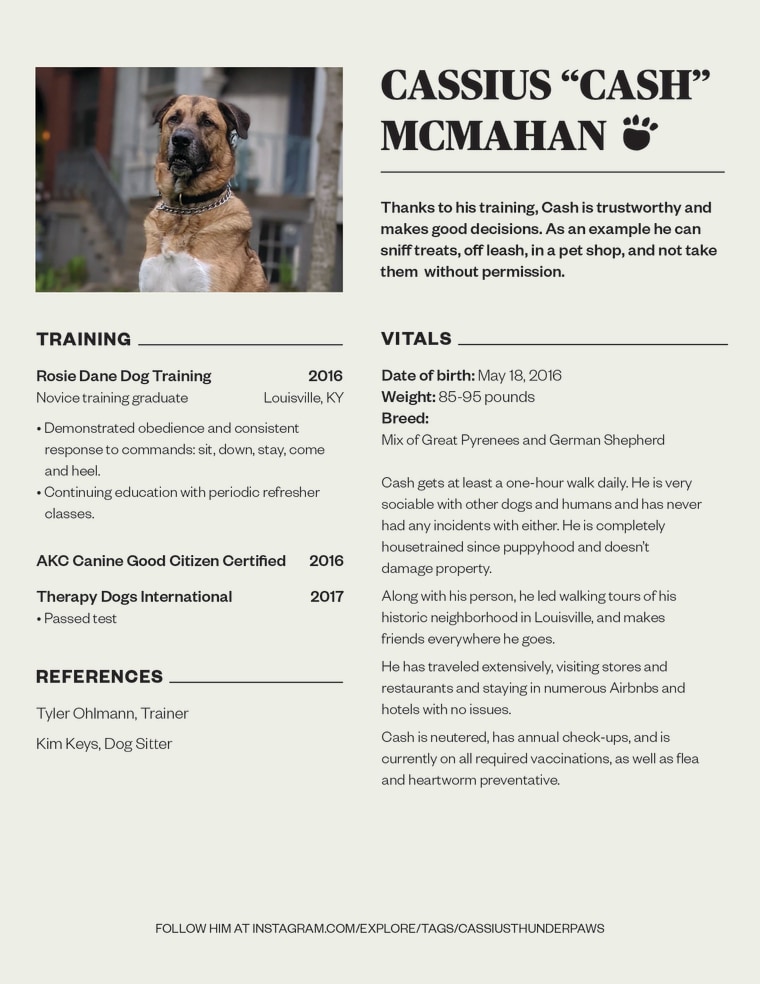Finding the right place to live in a competitive market is challenging enough, but if you’re a renter with a dog, it gets even harder. And if you have multiple dogs or breeds that have a bad rap? It can seem almost impossible.
I know from experience: I’m searching for an apartment in Nashville, Tennessee, as I write this. It’ll be a home base when my husband has to work in person at his new job. We’ll keep our home in Louisville, but I plan to spend some time there as well, which means our two dogs will be with us. (Truffle is a senior Pomeranian, and Cash is a 95-pound Great Pyrenees/German shepherd.) Suddenly, our options are dramatically limited. The one apartment we found in our price range allows a max of 100 pounds combined for two dogs, so that’s out. And if we can find a place, the costs — in an already eye-poppingly expensive city — will jump even higher, thanks to “pet rent” and extra deposits or fees.
It’s a somewhat ironic situation, since I’m an exceedingly dog-friendly landlord myself (I prefer renting to folks with dogs!) in the two rental spaces I've carved out of the restored Victorian we call home.
I’m not alone in having trouble with this search. Some 72% of residents say that pet-friendly housing is hard to find, according to Jam Stewart, vice president of corporate affairs for Mars Petcare North America, which offers a guide on 8 Tips to Be Successful When Renting With Pets.
The National Association of Realtors found that 81% of U.S. households say animal-related considerations play a role in choosing where they’ll live next. One in 10 Americans moved last year, Stewart shared, “and we see that trend continuing to move forward and actually accelerate, especially as the future of work has changed as you're seeing people migrate to different cities. A lot of those people moving will be pet owners, dog owners. And that's important because when you think about some of the stressors — the breed restrictions, size restrictions, exorbitant fees — that is what pet owners are facing.
81% of U.S. households say animal-related considerations play a role in choosing where they’ll live next.
National Association of Realtors
“It's a really tough situation to be in and actually gets exacerbated pretty quickly because if you can't find a place to live, what happens with that animal?” Stewart continued. “You may have to relinquish the animal … if that happens, what is the pressure that puts on the shelters or rescues? They may be full or may not have the ability to help with the animal so it really is a massive tension.”
Some of those barriers are specific to apartment communities or individual landlord policies, and others are local ordinances that may be long-held and haven’t been updated to address changes in how we view our companion animals, Stewart said. Twenty-one states have breed restrictions, according to the ASPCA, and countless cities and counties also ban specific breeds. Many insurance companies (mine included) won’t cover property owners who have certain breeds on premises. (Want to get involved in ending breed restrictions? The Association for Animal Welfare Advancement offers resources.)
But in the meantime, if you’re apartment-hunting with Rex and Rufus in tow, what can you do to improve your odds of landing a new pad?
My plan, one that Stewart endorsed, is to start by answering any questions landlords may have before they ask, and heading off any possible objections. A pet resume is a great way to do this, she said.
Let's rewind: Pets have resumes now? Yes. They’re a great place to gather all pertinent info about the pup in one place. You can use the resume to describe the dog’s personality, share what their daily schedule looks like and emphasize any training they’ve completed.

In our case, Cash started training at 8 weeks old and successfully passed the AKC Canine Good Citizen test. That’s the “gold standard” for obedience, Stewart said, but noted other courses or programs can be meaningful as well.
“It's really about trying to give that profile of what is your pet like,” she said. You can include details like whether they’re spayed or neutered, or if they're microchipped. “In addition, I think it's super helpful (to provide details on) your local vet, that you have your licenses up to date,” she said. “It really eliminates a lot of questions right up front.” It’s also an opportunity to note how much time they’ll spend alone each day and whether you work from home and will be with them most of the time.
Anything you can do to make it easier for the landlord to say yes can help. If they don’t have a standard pet interview, share a sample (Better Cities for Pets has a pet interview you can pass along). Be prepared with great answers about how your pet-owner practices will make you a good neighbor and assure them you’ll always clean up waste, keep pets clean, exercise them and keep them leashed.
Be sure to also suggest a pet agreement, if the landlord doesn't include one, which should detail what the rules are, what fees you’ll incur and what the process is for escalating any issues.
These efforts will demonstrate you’re a committed and responsible pet owner, Stewart said. And that could be enough to tip the scales in your favor because if the landlord stops to consider what their objections are, many could be alleviated by knowing that you — and your pup — will be good tenants and neighbors.
Related:
